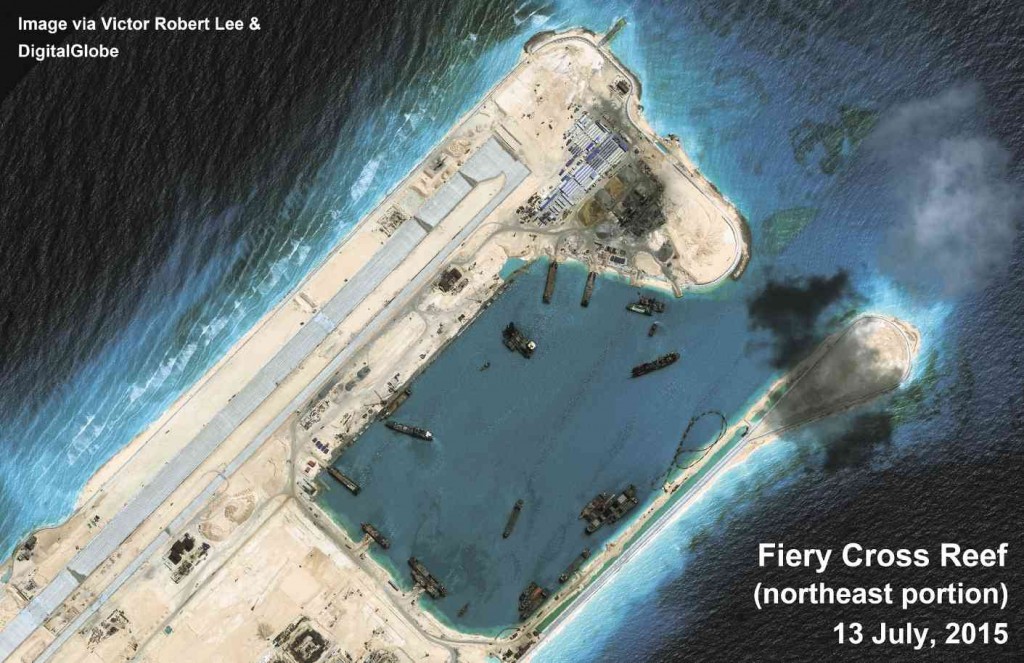
Photo from the air shows construction activities undertaken by China on Kagitingan Reef (Fiery Cross Reef), including an airstrip, in a disputed area in the South China Sea. The Philippines and China are among several countries disputing ownership of the reefs located on the Spratly Islands. PHOTO BY VICTOR ROBERT LEE AND DIGITALGLOBE
A Chinese official admitted that it sent ships to a disputed atoll in the South China Sea (West Philippine Sea) and “persuaded fishing boats to leave the waters,” adding that its vessels already left.
Speaking in Beijing, Chinese Foreign Ministry spokesman Hong Lei said the Ministry of Transportation dispatched ships to salvage a fishing vessel that had run aground near Jackson Atoll in late 2015 and which posed a risk to navigation.
During the operation, Chinese ships “persuaded fishing boats to leave the waters in an effort to ensure safety conditions for normal navigation,” Hong told reporters, adding the Chinese vessels returned home after completing their work.
READ: Tit for tat, US warns China | Part of West PH Sea has long been ours, says Aquino
Philippine Foreign Secretary Albert del Rosario confirmed that the Chinese coast guard ships sighted two weeks ago at a disputed atoll and sparked fears Beijing may take control of it were gone when the Philippine government checked on Wednesday.
Del Rosario said it’s uncertain if the Chinese ships would return, adding Philippine defense authorities were monitoring the disputed region. “They might be back tomorrow, they may not,” del Rosario told reporters.
Mayor Eugenio Bito-onon Jr., who heads a Philippine-claimed region in the Spratly Islands, said he also saw the Chinese ships at the atoll for two straight days last week while flying in a plane over the uninhabited, ring-shaped reef, which the Philippines calls Quirino.
Jackson Atoll lies several kilometers (miles) from the Philippine-claimed Mischief Reef, which China occupied in 1995 and has developed into an island.
A Philippine security official said an air force surveillance plane did not see Chinese vessels on a flight Wednesday. Still, the mere sighting of the Chinese vessels has set off concerns.
“I’m alarmed because we frequently pass by that atoll on our way to Pag-asa,” Bito-onon told The Associated Press by telephone, using the Filipino name for Thitu Island in the Spratlys where a small Filipino fishing community and troops stay.
In Washington, State Department spokesman Mark Toner said the U.S. was looking into the reports about the presence of Chinese vessels, but could not confirm them. He said the U.S. does not want to see China using its ships to intimidate fishing vessels in that region.
Filipino, Vietnamese and Malaysian fishing boats have gone to Jackson’s vast fishing lagoon for years, Bito-onon said.
In another concern, Bito-onon said Philippine planes landing and taking off at Thitu have been warned frequently to stay away by Chinese forces based at the nearby Subi Reef, one of seven disputed Spratly reefs that China have built into islands. The plane that he was on last week flew to Thitu and was shooed away by the Chinese too, he said.
“When you take off or land, you’ll hear their warning: ‘You are flying within our security zone, please leave immediately to avoid miscalculation,'” Bito-onon said.
Those Chinese warnings are an act of intimidation and show the threat to freedom of overflight in the region, he said.
The United States and Asian governments have expressed alarm over China’s island construction, saying it raises tensions, threatens regional stability and could violate freedom of navigation and overflight.
In New Delhi, U.S. Pacific Commander Admiral Harry Harris Jr. expressed his admiration for India’s peaceful approach to conflict resolution but cited how “some countries seek to bully smaller nations,” without naming China.
“Freedom of navigation on the high seas and the air space above them … are not privileges of rich and powerful countries,” Harris told a conference on Asian geopolitics. “They are fundamental rights of all nations.”
Aside from China and the Philippines, Vietnam, Malaysia, Taiwan and Brunei also lay claim to the Spratlys’ strategic waters.